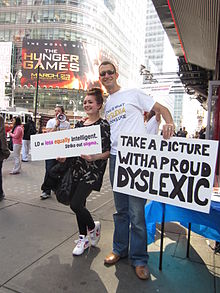
Back عجز التعلم Arabic Обучителни трудности Bulgarian Otežano učenje BS Trastorn d'aprenentatge Catalan Specifické poruchy učení Czech Anabledd dysgu Welsh Lernbehinderung German Μαθησιακές δυσκολίες Greek Lernomalkapablo Esperanto Dificultades en el aprendizaje Spanish
| Learning disability | |
|---|---|
| Other names | Learning difficulties,[1][2] developmental academic disorder,[3][4] nonverbal learning disorder,[4] developmental disorder of scholastic skills, unspecified,[4] knowledge acquisition disability NOS,[4] learning disability NOS,[4] learning disorder NOS[4] |
 | |
| People at a Learning Disabilities Month event[5] | |
| Specialty | Psychiatry, neurology |
Learning disability, learning disorder, or learning difficulty (British English) is a condition in the brain that causes difficulties comprehending or processing information and can be caused by several different factors. Given the "difficulty learning in a typical manner", this does not exclude the ability to learn in a different manner. Therefore, some people can be more accurately described as having a "learning difference", thus avoiding any misconception of being disabled with a possible lack of an ability to learn and possible negative stereotyping. In the United Kingdom, the term "learning disability" generally refers to an intellectual disability, while conditions such as dyslexia and dyspraxia are usually referred to as "learning difficulties".[6]
While learning disability and learning disorder are often used interchangeably, they differ in many ways. Disorder refers to significant learning problems in an academic area. These problems, however, are not enough to warrant an official diagnosis. Learning disability, on the other hand, is an official clinical diagnosis, whereby the individual meets certain criteria, as determined by a professional (such as a psychologist, psychiatrist, speech-language pathologist, or paediatrician). The difference is in the degree, frequency, and intensity of reported symptoms and problems, and thus the two should not be confused. When the term "learning disorder" is used, it describes a group of disorders characterized by inadequate development of specific academic, language, and speech skills.[7] Types of learning disorders include reading (dyslexia), arithmetic (dyscalculia) and writing (dysgraphia).[7]
The unknown factor is the disorder that affects the brain's ability to receive and process information. This disorder can make it problematic for a person to learn as quickly or in the same way as someone who is not affected by a learning disability. People with a learning disability have trouble performing specific types of skills or completing tasks if left to figure things out by themselves or if taught in conventional ways.
Individuals with learning disabilities can face unique challenges that are often pervasive throughout the lifespan. Depending on the type and severity of the disability, interventions, and current technologies may be used to help the individual learn strategies that will foster future success. Some interventions can be quite simplistic, while others are intricate and complex. Current technologies may require student training to be effective classroom supports. Teachers, parents, and schools can create plans together that tailor intervention and accommodations to aid the individuals in successfully becoming independent learners. A multi-disciplinary team frequently helps to design the intervention and to coordinate the execution of the intervention with teachers and parents.[8] This team frequently includes school psychologists, special educators, speech therapists (pathologists), occupational therapists, psychologists, ESL teachers, literacy coaches, and/or reading specialists.[9]
- ^ "Developmental academic disorder (Concept Id: C1330966) - MedGen". NCBI. 2019-12-20. Retrieved 2019-12-20.
- ^ "What are learning difficulties?". Touch-type Read and Spell (TTRS). 2019-05-31. Retrieved 2019-12-20.
- ^ "Code System Concept". phinvads.cdc.gov. 2018-12-05. Retrieved 2019-12-20.
- ^ a b c d e f "2020 ICD-10-CM Diagnosis Code F81.9: Developmental disorder of scholastic skills, unspecified". The Web's Free 2019/2020 ICD-10-CM/PCS Medical Coding Reference. 2019-10-01. Retrieved 2019-12-20.
- ^ Kate Adams (September 30, 2012). "October Is Learning Disabilities Awareness Month in Canada!". baytoday.ca. LDAO – North Bay and Area News Release. Retrieved 28 April 2015.
- ^ Gates, Bob; Mafuba, Kay (1 March 2016). "Use of the term 'learning disabilities' in the United Kingdom: issues for international researchers and practitioners". Learning Disabilities: A Contemporary Journal. 14 (1): 9–23. ISSN 1937-6928.
- ^ a b Childhood Voyages in Development, Third Edition, Thomson Wadsworth. (2008), p. 387. Retrieved 2012-12-19.
- ^ Reeder, Deborah L.; Arnold, Sandra H.; Jeffries, Lynn M.; McEwen, Irene R. (2011-01-19). "The Role of Occupational Therapists and Physical Therapists in Elementary School System Early Intervening Services and Response to Intervention: A Case Report". Physical & Occupational Therapy in Pediatrics. 31 (1): 44–57. doi:10.3109/01942638.2010.497180. ISSN 0194-2638. PMID 20735199. S2CID 24507004.
- ^ Dougherty Stahl, Katherine A. (May 2016). "Response to Intervention: Is the Sky Falling?". The Reading Teacher. 69 (6): 659–663. doi:10.1002/trtr.1457.
© MMXXIII Rich X Search. We shall prevail. All rights reserved. Rich X Search